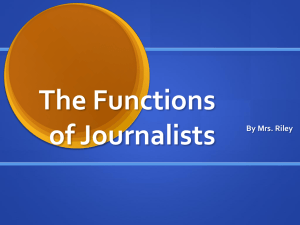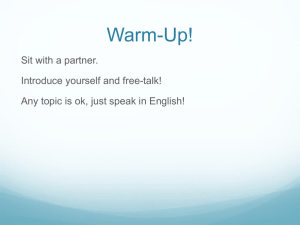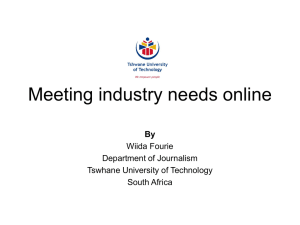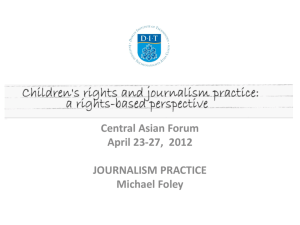Topic 1: Censorship Censorship is the suppression of expression
advertisement
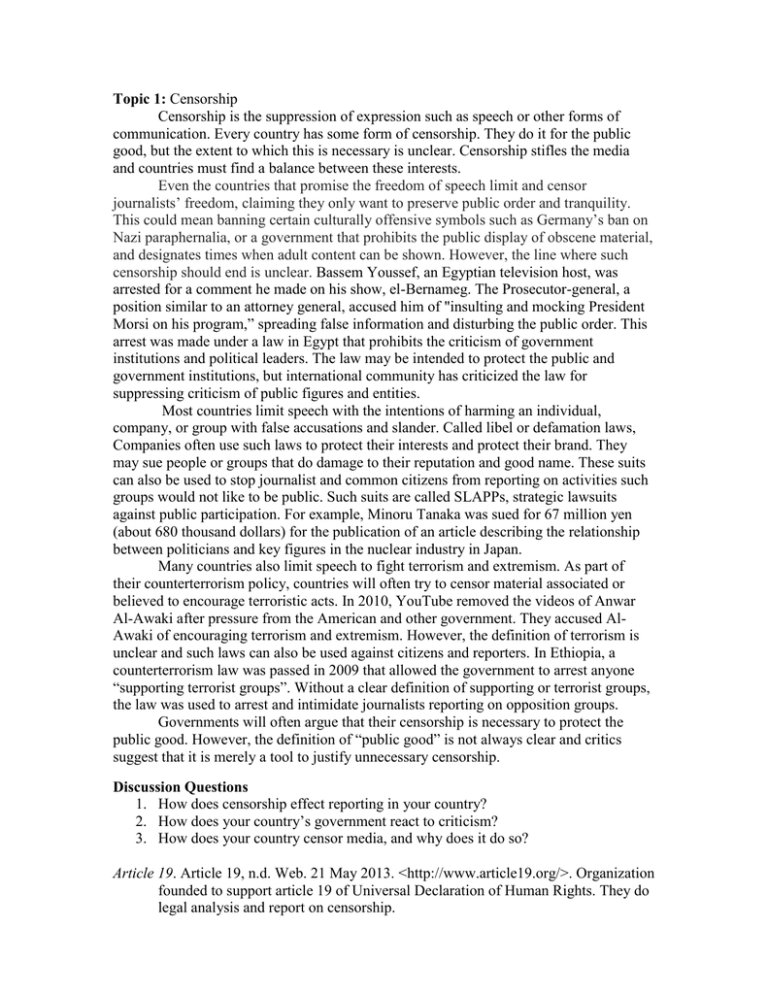
Topic 1: Censorship Censorship is the suppression of expression such as speech or other forms of communication. Every country has some form of censorship. They do it for the public good, but the extent to which this is necessary is unclear. Censorship stifles the media and countries must find a balance between these interests. Even the countries that promise the freedom of speech limit and censor journalists’ freedom, claiming they only want to preserve public order and tranquility. This could mean banning certain culturally offensive symbols such as Germany’s ban on Nazi paraphernalia, or a government that prohibits the public display of obscene material, and designates times when adult content can be shown. However, the line where such censorship should end is unclear. Bassem Youssef, an Egyptian television host, was arrested for a comment he made on his show, el-Bernameg. The Prosecutor-general, a position similar to an attorney general, accused him of "insulting and mocking President Morsi on his program,” spreading false information and disturbing the public order. This arrest was made under a law in Egypt that prohibits the criticism of government institutions and political leaders. The law may be intended to protect the public and government institutions, but international community has criticized the law for suppressing criticism of public figures and entities. Most countries limit speech with the intentions of harming an individual, company, or group with false accusations and slander. Called libel or defamation laws, Companies often use such laws to protect their interests and protect their brand. They may sue people or groups that do damage to their reputation and good name. These suits can also be used to stop journalist and common citizens from reporting on activities such groups would not like to be public. Such suits are called SLAPPs, strategic lawsuits against public participation. For example, Minoru Tanaka was sued for 67 million yen (about 680 thousand dollars) for the publication of an article describing the relationship between politicians and key figures in the nuclear industry in Japan. Many countries also limit speech to fight terrorism and extremism. As part of their counterterrorism policy, countries will often try to censor material associated or believed to encourage terroristic acts. In 2010, YouTube removed the videos of Anwar Al-Awaki after pressure from the American and other government. They accused AlAwaki of encouraging terrorism and extremism. However, the definition of terrorism is unclear and such laws can also be used against citizens and reporters. In Ethiopia, a counterterrorism law was passed in 2009 that allowed the government to arrest anyone “supporting terrorist groups”. Without a clear definition of supporting or terrorist groups, the law was used to arrest and intimidate journalists reporting on opposition groups. Governments will often argue that their censorship is necessary to protect the public good. However, the definition of “public good” is not always clear and critics suggest that it is merely a tool to justify unnecessary censorship. Discussion Questions 1. How does censorship effect reporting in your country? 2. How does your country’s government react to criticism? 3. How does your country censor media, and why does it do so? Article 19. Article 19, n.d. Web. 21 May 2013. <http://www.article19.org/>. Organization founded to support article 19 of Universal Declaration of Human Rights. They do legal analysis and report on censorship. "Censorship." Mashable. Mashable, 2005-2013. Web. 21 May 2013. <http://mashable.com/category/censorship/>. Mashable's new on digital censorship. Committee to Protect Journalists. Committee to Protect Journalists, n.d. Web. 21 May 2013. <http://www.cpj.org/>. An advocacy of group for journalists, they report on censorship of journalist and attacks against them. Freedom of Info. Matrix Group International, n.d. Web. 21 May 2013. <http://www.freedominfo.org/>. Tracks freedom of information laws in various countries and compiles data on how open governments are with information. "Media Freedom." Freedom House. Freedom House, n.d. Web. 21 May 2013. <http://www.freedomhouse.org/issues/media-freedom>. Reports on media freedom in the world. The reports include an interactive map with descriptions of each country. OpenNet Initiative. Citizen Lab at the Munk School of Global Affairs at U of Toronto, the Berkman Center for Internet & Society at Harvard, and the SecDev Group, n.d. Web. 21 May 2013. <https://opennet.net/research>. Reports on internet freedom. The internet is a common avenue for citizen journalists, therefore a common target for censorship. Reporters Without Borders. Reporters sans Frontières, n.d. Web. 21 May 2013. <http://en.rsf.org/>. A French NGO dedicated to helping reporters around the world. They report on censorship attempts by governments and the dangers journalists face. RTI Rating. Access Info and the Center for Law and Democracy, n.d. Web. 21 May 2013. <http://rti-rating.org/home.php>. Reports on and ratings of right to information laws (aka freedom of information laws). Such laws are an important part of transparency in government. "Trends by Right to Freedom of Expression." Human Rights House Network. Human Rights House, n.d. Web. 21 May 2013. <http://humanrightshouse.org/Trends/index.html?right=Freedom%20of%20expre ssion>. Reports on human rights abuses in nations they operate in. We Fight Censorship. Reporters Without Borders, n.d. Web. 21 May 2013. <https://www.wefightcensorship.org/>. A project by Reporters Without Borders that aims to combat censorship and promote the flow of news and information. Topic 2: Journalist Security "It appears more journalists have been subjected to harassment, physical threat, kidnapping and direct violence than in previous years. I call on government authorities everywhere to ensure that crimes against journalists do not go unpunished. And I call on citizens everywhere to make such impunity unacceptable.”, Koichiro Matsuura told the audience in a speech to the World Press Freedom Day 2003. Organizations such as Reporters Without Borders and the Committee to Protect Journalists, who campaign to improve protections for journalists, cite poor enforcement of and poor safety standards as contributing to the risk to journalists. Reporters, doing everything they can to get the best and most accurate story, are often times caught in the crossfire of dangerous war zones. According to Reporters Without Borders, 2012 was the deadliest year for journalists in Somalia, as dozens were killed in shootings and bombings by the various fractions in Somalia. The local government is generally unable or unwilling to stop this violence and aggression towards journalists, and have even been found to partake in the action when they want to silence reporters. According to Reporters Without Borders, the war between the Taliban and the Pakistan government has created a “minefield of the Media” for reporters in the country. Government crackdowns have also proved more bloody than not. In many undemocratic countries, the government has turned to violence, fear, and brute force to suppress reporting. The civil war in Syria was one of the bloodiest for journalists, as it left 23 dead, and another 58 citizen-journalists dead. Regarding the death of Ayham Mostafa Ghazzoul, the Secretary-General of Reporters Without Borders stated that “It is important that light be shed on the circumstances of this tragic incident and that all parties to the conflict taking place in Syria respect the civilian status of all journalists and their right to freedom of expression”. Since 2011, the Secretary-General has condemned the killing of over 45 journalists and reporters, including Ghazzoul. Such violence is not limited to Syria. Many murders of journalist across the world have been at the hands of their own governments. Attacks by criminal organizations and various other groups can also plague journalists. The lack of government protection against these acts, such as murder and assault, can lead to impunity for such crimes, and can increase their likelihood. Drug cartels run rampant in the Americas, targeting journalists reporting on drug trafficking, corruption, and organized crime. More than six journalists have been killed in Mexico for their work and publications on the drug war. Corruption within the government often leads to them overlooking these crimes. Cartels use threats and bribes to get the government to play along. Discussion Questions 1. What risks do journalists face when reporting in your country? 2. What kind of protections does your country’s government provide for journalists? 3. What is your countries record on journalist safety? Resources: Committee to Protect Journalists. Committee to Protect Journalists, n.d. Web. 21 May 2013. <http://www.cpj.org/>. An advocacy of group for journalists. They report on censorship of journalist and attacks against them. Horsley, Willam. OSCE Safety of Journalists Guidebook. Ed. Jean-Christophe Peuch and Mike Stone. Organization for Security and Cooperation in Europe. Organization for Security and Cooperation in Europe, 1995-2013. Web. 21 May 2013. <http://www.osce.org/fom/85777>. OSCE's guidebook on journalist's safety. Talks about the problem for the perspective of governments. International Federation of Journalists. International Federation of Journalists, n.d. Web. 22 May 2013. <http://www.ifj.org/en>. An international trade union for journalists, they advocate for journalists’ rights across the world International News Safety Insitute. International News Safety Institute, 2013. Web. 21 May 2013. <http://www.newssafety.org/>. The International News Safety Institute provides information on the dangers journalist may face in when reporting in their respective country. They have an interactive map that describes the safety situation across the world. "Journalists' Safety." International Journalists' Network. nternational Center for Journalists, n.d. Web. 22 May 2013. <http://ijnet.org/topics/journalists-safety>. IJNet's resources and article on journalists' safety. "Mission Reports." Reporters Without Borders. Reporters Without Borders, n.d. Web. 22 May 2013. <https://en.rsf.org/rapports-de-mission,19.html>. RWB's reports on conditions in various countries. Topic 3: Coverage Regional Issues and Conflicts Where a news services is from can affect how its journalists report. Reporting is often influenced by the social and cultural attitudes of the journalists and audience. The presses of various nation view conflicts between countries with different lenses. Such variety in the type of coverage can affect how the cover world affairs. From either nationalistic fervor or organized efforts by governments, news is delivered from the perspective of the news service’s nation. News services natural what to create material that appeals to their audience. By questioning or undermining the idea of their country’s greatness, news services can alienate their audiences. During the Iraq invasion, American and Middle Eastern news services would report day-to-day fighting in different manners. For example, coverage of a battle in December 2003 varied between American outlets such as the New York Times and Middle Eastern outlets such as Al Jazeera. The New York Times call the dead insurgents while Al Jazeera called them civilians as well while the New York Times accepted the American commanders claim that they were ambushed, Al Jazeera question the claim. The American media naturally side with their countrymen while sources such as Al Jazeera tended to be more distrusting. While in this case it is people trusting what is local to them over what is foreign, sometimes bias is forced systematically by the government. In the case of North Korea State media, the ultimate goal of their news coverage is to deride their enemies and puff up their own country. The media will often insult opposing nations while praising the North Korean leadership and institutions, such as the infamous news story that declared the North Korean soccer team was so good they won the world cup early after they lost in the first round. Bias can also come in the form of viewpoint bias, limiting the viewpoints shown in a debate. People are naturally able to understand their countrymen better than they can understand foreigners. This leads news services to favor experts and guests of their own nation over those of another. Such as in the case of NHK, during their coverage of the American debt ceiling debate they brought on an economist to explain the debate to the audience. NHK, being a Japanese broadcasting service, chose a member of Japanese intelligentsia. Such actions, while meant to make it easier for the audience to understand, also inherently bias the conversation. The actions of NHK were rather benign as the bias would be minute, if any. However, there are cases of more severe bias, such as only having generals debate going to war or limiting scientific debates to politicians. Bias is not always intentional but naturally arises. Even news services that attempt to be objective will succumb to bias. Recognizing the bias and seeing things from multiple lenses can help create a more complete worldview. Discussion Questions: 1. How does your new service cover international affairs? 2. How biased is your news service’s coverage? 3. What factors create your news service’s bias? Resources: Al Jazeera English. Al Jazeera, 2013. Web. 23 May 2013. <http://www.aljazeera.com/indepth/>. A trusted Middle Eastern news service with the stated goal of giving the lesser heard side of the story. Something to which you can compare your news service. BBC News. BBC, 2013. Web. 23 May 2013. <http://www.bbc.com/news/>. British news service trusted across the world. A good service to compare you news service to. Gentzkow, Matthew, and Jesse Shapiro. Media Bias and Reputation. Cambridge: NBER, 2005. National Bureau of Economic research. Web. 23 May 2013. <http://www.nber.org/papers/w11664>. A report discussing bias and its affect on the reputation of news sources. Global Media Wars. Columbia School of Journalism, 2013. Web. 23 May 2013. <http://globalmediawars.com/>. A project by students at Columbia School of Journalism, the website rates and compares RT, France 24, Al Jazeera, CC-TV, and Press TV. "The Harvard International Journal of Press/Politics, Vol 4." Project MUSE. John Hopkins UP, n.d. Web. 23 May 2013. <http://muse.jhu.edu/journals/harvard_international_journal_of_press_politics/toc /prp4.3.html>. Old issue of the Harvard Journal of International Press/Politics. The studies look at bias in the press and how the press affects politics. "Listening Post." Al Jazeera English. Al Jazeera, 2013. Web. 23 May 2013. <http://www.aljazeera.com/programmes/listeningpost/>. A weekly news analysis show. The look a media across the world. Mullainathan, Sendhil, and Andrei Shleifer. Media Bias. Cambridge: NBER, 200. National Bureau of Economic research. Web. 23 May 2013. <http://www.nber.org/papers/w9295>. A report discussing bias and its possible causes. News Bias Explored. U of Michigan, n.d. Web. 23 May 2013. <http://www.umich.edu/~newsbias/index.html>. This website talks about different kinds of media bias. Reuters. Thomson Reuters, n.d. Web. 23 May 2013. <http://www.reuters.com/>. Reuters is a news wire service. News wire services give other news services stories for them to publish. This can be used as something to compare your news services to. Rosen, Nir. "Western Media Fraud in the Middle East." Editorial. Al Jazeera English. Al Jazeera, 18 May 2011. Web. 23 May 2013. <http://www.aljazeera.com/indepth/opinion/2011/05/201151882929682601.html> . An op-ed talking about the problems with the western media's coverage of the Middle East. While the op-ed focuses on the Middle East, the basic ideas behind it can be applied to any region.
